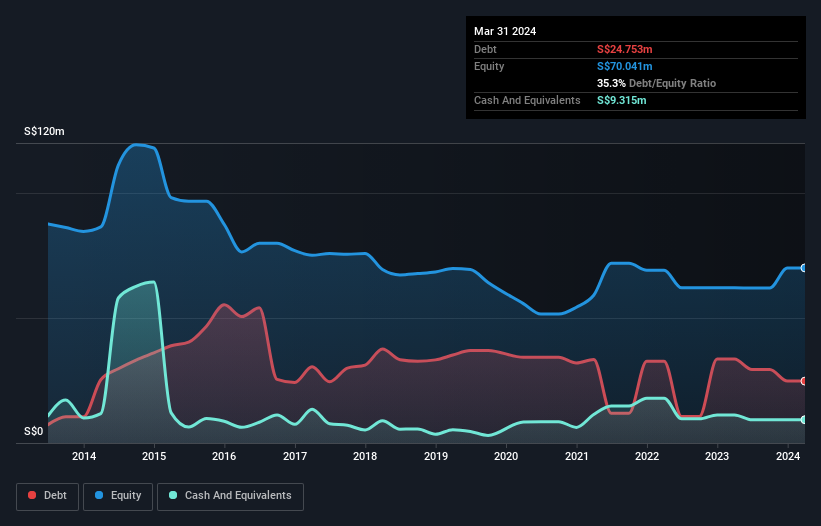
Warren Buffett famously said, 'Volatility is far from synonymous with risk.' So it seems the smart money knows that debt - which is usually involved in bankruptcies - is a very important factor, when you assess how risky a company is. As with many other companies King Wan Corporation Limited (SGX:554) makes use of debt. But should shareholders be worried about its use of debt?
What Risk Does Debt Bring?
Generally speaking, debt only becomes a real problem when a company can't easily pay it off, either by raising capital or with its own cash flow. Ultimately, if the company can't fulfill its legal obligations to repay debt, shareholders could walk away with nothing. However, a more frequent (but still costly) occurrence is where a company must issue shares at bargain-basement prices, permanently diluting shareholders, just to shore up its balance sheet. Of course, plenty of companies use debt to fund growth, without any negative consequences. When we think about a company's use of debt, we first look at cash and debt together.
Check out our latest analysis for King Wan
What Is King Wan's Net Debt?
The image below, which you can click on for greater detail, shows that King Wan had debt of S$24.8m at the end of March 2024, a reduction from S$33.6m over a year. However, because it has a cash reserve of S$9.32m, its net debt is less, at about S$15.4m.

How Strong Is King Wan's Balance Sheet?
We can see from the most recent balance sheet that King Wan had liabilities of S$51.0m falling due within a year, and liabilities of S$465.0k due beyond that. Offsetting this, it had S$9.32m in cash and S$26.2m in receivables that were due within 12 months. So it has liabilities totalling S$16.0m more than its cash and near-term receivables, combined.
This deficit is considerable relative to its market capitalization of S$23.7m, so it does suggest shareholders should keep an eye on King Wan's use of debt. This suggests shareholders would be heavily diluted if the company needed to shore up its balance sheet in a hurry. There's no doubt that we learn most about debt from the balance sheet. But it is King Wan's earnings that will influence how the balance sheet holds up in the future. So if you're keen to discover more about its earnings, it might be worth checking out this graph of its long term earnings trend.
In the last year King Wan wasn't profitable at an EBIT level, but managed to grow its revenue by 3.3%, to S$96m. That rate of growth is a bit slow for our taste, but it takes all types to make a world.
Caveat Emptor
Over the last twelve months King Wan produced an earnings before interest and tax (EBIT) loss. Indeed, it lost a very considerable S$3.5m at the EBIT level. Considering that alongside the liabilities mentioned above does not give us much confidence that company should be using so much debt. Quite frankly we think the balance sheet is far from match-fit, although it could be improved with time. On the bright side, we note that trailing twelve month EBIT is worse than the free cash flow of S$2.8m and the profit of S$12m. So if we focus on those metrics there seems to be a chance the company will manage its debt without much trouble. There's no doubt that we learn most about debt from the balance sheet. But ultimately, every company can contain risks that exist outside of the balance sheet. Be aware that King Wan is showing 3 warning signs in our investment analysis , you should know about...
If you're interested in investing in businesses that can grow profits without the burden of debt, then check out this free list of growing businesses that have net cash on the balance sheet.
Valuation is complex, but we're here to simplify it.
Discover if King Wan might be undervalued or overvalued with our detailed analysis, featuring fair value estimates, potential risks, dividends, insider trades, and its financial condition.
Access Free AnalysisHave feedback on this article? Concerned about the content? Get in touch with us directly. Alternatively, email editorial-team (at) simplywallst.com.
This article by Simply Wall St is general in nature. We provide commentary based on historical data and analyst forecasts only using an unbiased methodology and our articles are not intended to be financial advice. It does not constitute a recommendation to buy or sell any stock, and does not take account of your objectives, or your financial situation. We aim to bring you long-term focused analysis driven by fundamental data. Note that our analysis may not factor in the latest price-sensitive company announcements or qualitative material. Simply Wall St has no position in any stocks mentioned.
Have feedback on this article? Concerned about the content? Get in touch with us directly. Alternatively, email editorial-team@simplywallst.com
About SGX:554
King Wan
An investment holding company, provides mechanical and electrical engineering services for the building and construction industry in Singapore.
Adequate balance sheet low.
Market Insights
Community Narratives



